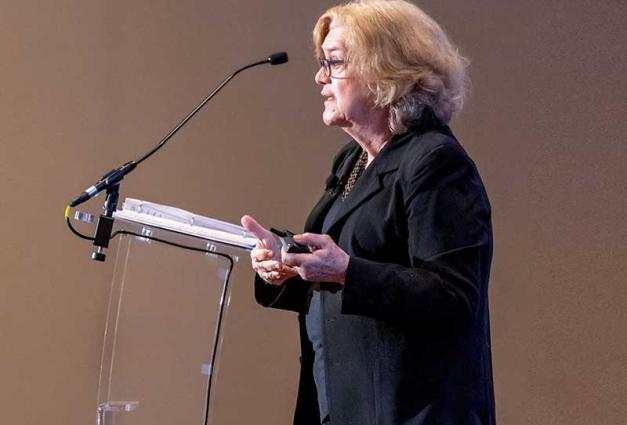At the annual awards ceremony during the 2018 Annual Convention, Northeastern University Distinguished Professor Judith Hall was honored with one of our two Career Contribution awards. This award is intended to recognize a member who has made significant contributions to the field over the course of their career, but has perhaps not been recognized at the level they deserve. Since many of the award recipients did not have the opportunity to speak at the ceremony, we wanted to take a moment to learn more about Judith and the important body of work she has contributed to the field.
What have you enjoyed most about being a psychologist?
Doing research that I enjoy, and mentoring grad students and postdocs. For many years it's been such a treat developing with them, or even following their lead on, so many different topics that I otherwise might not have tackled. These include the nonverbal expression and self-presentation of intelligence, how people detect co-variations in the social environment, the expression and detection of pain, the deliberate Duchenne smile, the nonverbal expression of sexism, the modeling of stereotype accuracy, and many others. Those mentoring relationships are priceless to me and I am not referring only to the research productivity side of the relationship. I’m including the fun and the ongoing bond, whether we are still doing research together or not. Also, I greatly enjoy writing—which is such a key to one’s career success. I tell our new grad students every year they are entering a writing profession, so they should buy into that and learn to love it and be good at it. If you are not writing, you are reading/critiquing other people’s writing.
If you had no constraints (funding, logistics, ethics, etc.), is there a “dream” investigation that you would like to undertake or a research study you would like to revisit?
I’d love to know more about how healthcare providers make use (or disuse) of their interpersonal perception skills. I designed a lovely but not very practically feasible study that I’d still love to do: to find out whether health care is adversely affected by providers’ failure to understand patients’ emotions or needs, especially in cultural groups other than their own (for example, a white doctor with minority group patient). I’d like to know whether such failures are due to negative/deficient provider attitudes or motivation, or due to the patient not expressing their emotions or needs in ways that can be recognized well, due to a lack of trust in majority group providers, or to cultural differences in expression norms.
Looking back on your career, what are you most proud of?
I am proud of helping to establish the nonverbal communication field as a recognized interdisciplinary field, and not just a fringe topic and measurement toolbox for researchers. I’m also proud of helping along the careers of my mentees when I was able to—helping to keep up their enthusiasm and build their skills.
Looking ahead, what are some research areas you would like to explore in greater detail?
If I had another life, I’d study human-animal communication, or animal communication in natural habitats, ideally using experimental methods.
If you could go back and give your 21-year-old self some advice, what would you say?
When I was 21, I had no idea what I was going to do career-wise. I didn’t major in psychology and didn’t discover it until several years after college when I became the research assistant for Robert Rosenthal at Harvard (he later became my PhD advisor). That changed everything. So my advice would be: Opportunities can arrive kind of randomly, and often the turning point—the epiphany (THIS is what I want to do!)—is the result of those lucky occurrences and the application of good sense and good self-insight. And the presence of an inspirational mentor, such as I had. I’m glad I didn’t leap prematurely into another career path.




